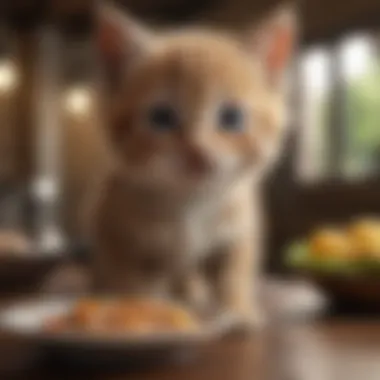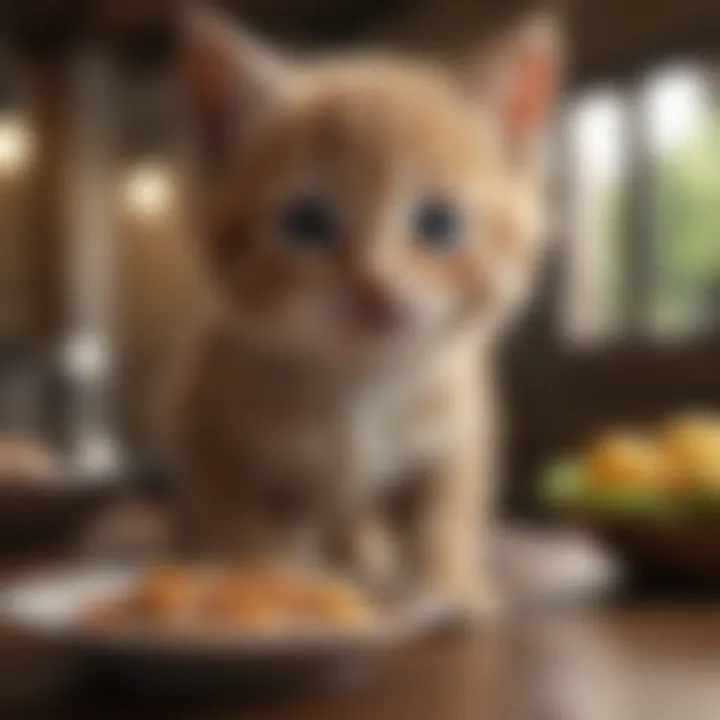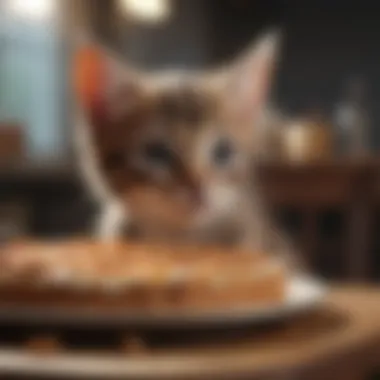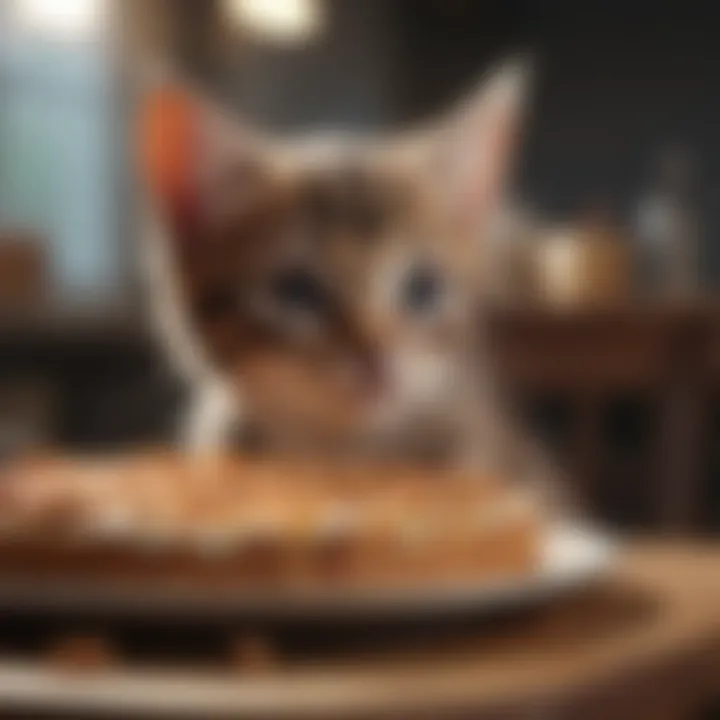What Do Kittens Eat: A Comprehensive Guide to Nutrition


Intro
Understanding what kittens eat is paramount for their well-being. A proper diet significantly impacts their growth, behavior, and overall health. As these young felines develop, their nutritional requirements evolve. Hence, it is essential to be aware of the various factors that contribute to a kitten's diet. Through this comprehensive guide, we will explore the different components of a kitten's diet, suitable food types, feeding practices, and the transition to adult food. This information aims to empower cat owners with the knowledge needed to provide optimal care for their kittens.
Animal Overview
Common Names
Kittens, being juvenile cats, are often referred to simply as kittens. In a broader sense, they belong to the Felidae family, which includes all domestic and wild cats.
Scientific Classification
Kittens are classified as follows:
- Kingdom: Animalia
- Phylum: Chordata
- Class: Mammalia
- Order: Carnivora
- Family: Felidae
- Genus: Felis
- Species: Felis catus
Geographic Range
Kittens, or domestic cats, are found across the globe. They can adapt to various environments, making them prevalent in rural and urban settings alike. Their adaptability to different climatic conditions further facilitates their geographic spread.
Behavior and Social Structure
Social Behavior
Kittens are sociable creatures. They often form bonds with their littermates and human caretakers. Play is crucial for their social development, allowing them to learn skills that will be essential as they grow.
Communication
Communication among kittens involves a mix of vocalizations, body language, and scent marking. They meow, purr, and even hiss to express their emotions. Understanding these forms of communication fosters better interaction between kittens and owners.
Mating and Reproduction
Kittens are born after a gestation period of about 63 days. They typically are born in litters ranging from one to five. Ideal environmental conditions promote a healthy mating process, influencing both the mother and the kittens’ health.
Habitat and Ecosystem
Natural Habitat
While domestic cats can thrive in a wide range of environments, they are primarily found in human habitation. Typically, they enjoy indoor spaces but also benefit from outdoor access. Safe outdoor explorations allow them to engage with their environment.
Food Sources and Diet
As obligate carnivores, kittens require high protein diets. Their growth demands essential nutrients found in animal-based food. Meat, fish, and poultry are often primary components of their diet, ensuring they receive adequate levels of taurine, vitamins, and minerals crucial for development.
Role in Ecosystem
Kittens and cats play a role in controlling pest populations. While their impact varies, domesticated cats can help maintain a balance in the local ecosystem by regulating rodent numbers. This dynamic interaction demonstrates their importance beyond mere companionship.
Proper care and understanding of what kittens eat fosters a strong bond and promotes long-term health.
In summary, providing proper nutrition for kittens is not a trivial task. Each aspect, from their social structure to their habitat, plays a critical part in shaping their dietary needs. Owners should strive to create an environment that promotes healthy eating, ensuring their kittens develop into robust, well-adjusted adult cats.
Overview of Kitten Nutrition
Understanding kitten nutrition is crucial for their growth and overall health. Proper nutrition has far-reaching effects on a kitten's development—physically, mentally, and socially. A well-balanced diet provides not only energy but also the essential nutrients needed for optimal functioning. As kittens grow, their bodies require specific components to support rapid growth, brain development, and a strong immune system. Therefore, knowing the right dietary choices is essential for kitten owners.
Importance of Nutrition
Nutrition plays a central role in a kitten's life. During the first year, a kitten experiences significant growth. Poor nutrition can lead to issues such as stunted growth or a weakened immune system. Moreover, kittens that are not fed appropriately may exhibit behavioral problems, as nutrition impacts brain development. Owners should recognize that a balanced diet is not just about preventing under-nourishment— it's about fostering a healthy trajectory for a lifelong well-being.
Key Nutritional Components
A complete kitten diet should consist of key nutritional elements. Each component contributes uniquely to a kitten's growth, making it imperative to understand their roles.
Proteins


Proteins are essential for building muscle and repairing tissues. They provide the necessary amino acids that kittens cannot synthesize on their own. The primary advantage of protein is its quality; animal-based proteins are generally seen as more beneficial. These proteins also support a healthy immune system and play a role in hormone production. However, over-reliance on protein without balancing other nutrients can lead to health issues, so careful consideration is necessary when choosing protein sources.
Fats
Fats are an important energy source for kittens. They are a concentrated form of energy that aids in absorbing certain vitamins. Moreover, fats help in the development of the brain and nervous system. While they are crucial for energy, the type of fat matters. Omega-3 and Omega-6 fatty acids are particularly beneficial, promoting healthy skin and coat. On the downside, excessive fat in a kitten’s diet can lead to obesity, making it essential to measure fat levels carefully.
Vitamins
Vitamins are vital for various bodily functions. Each vitamin carries out its unique role; for example, Vitamin A is crucial for vision, while B vitamins support metabolism. The distinct advantage of including vitamins in a kitten's diet lies in their role in preventing deficiencies that can cause serious health issues. Care must be taken, however, as excessive vitamin intake can be harmful. Thus, a balanced diet avoids both deficiencies and excesses.
Minerals
Minerals are necessary for bone development, enzyme function, and hormonal balance. Key minerals like calcium and phosphorus are particularly important during growth stages. The unique feature of minerals is their structural role; they help form teeth and bones. However, too high levels of certain minerals can lead to health concerns, underscoring the importance of a balanced intake.
Water
Water is often an overlooked component of kitten nutrition. However, hydration is vital for all physiological processes. Kittens should have constant access to clean water, as proper hydration aids in nutrient transportation and waste elimination. A well-hydrated kitten is generally more active and healthy. Furthermore, water content in wet food can supplement hydration needs. Lack of water can lead to serious health problems like urinary tract issues, making it a top priority in feeding.
It is essential to provide a balanced diet that encompasses all these nutritional components to ensure healthy development.
Types of Kitten Food
Understanding the various types of kitten food is crucial for pet owners. Selecting the right food ensures that kittens receive essential nutrients for growth and overall health. Different food types have unique benefits and drawbacks, influencing their suitability for different kittens.
Commercial Kitten Food
Commercial kitten food is formulated specifically for the needs of growing kittens. It is often nutritionally balanced, making it a convenient choice for many cat owners.
Canned Food
Canned food is a popular option for feeding kittens. One key characteristic of canned food is its high moisture content, which helps with hydration. This is particularly beneficial since kittens may not drink enough water on their own.
Canned food is palatable and often contains a mix of proteins and fats, contributing to healthy weight gain and muscle development. However, its primary downside is the higher cost compared to dry food and the need for refrigeration after opening.
Dry Food
Dry food, also known as kibble, is another common choice. It is generally more affordable and convenient than canned food. A notable advantage of dry food is its long shelf life and ease of storage. Additionally, dry food can help keep a kitten's teeth clean due to the crunchiness of the kibble.
However, dry food lacks moisture content which could be a concern for hydration. It's important to ensure that kittens have access to fresh water if dry food is their main diet.
Raw Diet
Raw diets have gained popularity among some cat owners. This diet typically consists of raw meat, organs, and bones, aligned closely with a kitten's natural feeding habits. One significant advantage of a raw diet is that it may provide higher protein levels and fewer carbohydrates than commercial options.
On the downside, preparing a raw diet can be time-consuming and requires careful handling to avoid bacterial contamination. Moreover, a lack of certain nutrients may occur without proper supplementation.
Homemade Diets
Homemade diets allow cat owners to customize their kittens’ meals according to specific nutritional needs. It is imperative to choose appropriate ingredients to ensure a balanced diet.
Ingredients to Include
When preparing a homemade diet, it's essential to include high-quality protein sources such as chicken, turkey, or fish. These proteins are vital for growth and development. Other beneficial ingredients could include rice or vegetables, providing additional nutrients. Balanced home-cooked meals can lead to healthier kittens, but careful planning is crucial to avoid deficiencies.
Ingredients to Avoid
Not all human food is safe for kittens. It’s vital to avoid ingredients toxic to cats, like onions, garlic, and chocolate. Additionally, dairy should be limited, as many cats cannot digest lactose properly. Understanding these restrictions is crucial to ensuring kittens remain healthy while on a homemade diet.
Important: Discussing any dietary plans or changes with a veterinarian is advisable to ensure all nutritional needs are met.
Feeding Guidelines for Kittens
Feeding guidelines for kittens are vital to ensure their healthy growth and development. Proper feeding helps establish good eating habits, supports their immune system, and provides energy for daily activities. It's essential to understand the specific needs of kittens at various stages of their early life. This section will provide detailed insights into age-based feeding recommendations and meal frequency to help owners make informed decisions for their kittens' diets.
Age-Based Feeding Recommendations


Newborn to Four Weeks
Kittens in the newborn to four weeks age range rely solely on their mother’s milk or a suitable milk replacer if the mother is not available. This early stage is crucial for development, as they require high-fat content for energy and nutrients to support their immune systems. Nursing provides antibodies and nutrients essential for their early months. It is beneficial for the kittens during this time since it promotes healthy growth and bonding with their mother. While there are pre-formulated milk replacers available, it’s important to ensure they are specifically made for kittens, as cow's milk is not suitable. The unique feature of this age group is that they are fully dependent on milk, making it easy to manage their diet. However, if they are not nursing effectively, owners must step in to provide adequate nutrition to avoid health risks.
Four to Eight Weeks
As kittens reach the four to eight weeks stage, they begin to transition from milk to solid food. At this age, they can start being introduced to wet or dry kitten food, which is specifically formulated to meet their growing nutritional needs. This transition is important as it encourages exploration and helps with jaw development. Kittens will still benefit from some nursing, but by eight weeks, they should be primarily eating solid food. Introducing food at this time is crucial for their development and helps prevent dietary issues later in life. This age group is marked by curiosity and increased activity, making it essential for them to have balanced meals that provide the energy they need for their playfulness. The unique aspect here is the ability to absorb nutrients from both solid food and milk, giving owners flexibility in managing their diet.
Eight Weeks to Six Months
From eight weeks to six months, kittens should be on a specialized high-quality kitten food to support their rapid growth. This period is characterized by significant physical and behavioral changes, necessitating a diet rich in proteins and essential fats. Kittens will require more frequent feeding during this time, roughly three to four meals per day, to keep up with their energy levels. It is advantageous as they are more active and will develop muscle tone and strength with the right nutrition. The unique feature of this stage is the transformation from a reliant newborn to a playful, agile young cat. However, it’s crucial to ensure that they are not overfed, as this can lead to obesity. Feeding guidelines in this stage are important as they lay the foundation for their dietary habits in adulthood.
Meal Frequency
When it comes to meal frequency, kittens should be fed small, frequent meals throughout the day. Unlike adult cats, kittens have smaller stomachs relative to their energy needs. Feeding three to four times daily is ideal until they reach six months of age. This helps regulate their metabolism and ensures they are getting the necessary nutrients without overloading their digestive systems. Owners can set a feeding schedule that aligns with their routines, promoting consistency in the kittens' diet. It's essential to monitor their weight and adjust meal portions accordingly. A proper feeding routine supports healthy growth and avoids common feeding concerns like overfeeding and obesity.
Regular feeding schedules can aid in behavioral training and create a structured environment for kittens, leading to happier pets.
Transitioning from Kitten Food
Transitioning from kitten food is a crucial phase in a feline's development. As kittens grow, their nutritional needs change. Shifting to adult food entails more than simply changing brands. It requires understanding the appropriate timing and methods for a smooth transition that maintains the kitten's health and comfort.
When to Transition
Timing is essential when it comes to transitioning your kitten's diet. Most kittens are ready to move from kitten food to adult food around twelve months of age. However, some factors can influence timing:
- Breed and size: Larger breeds, such as Maine Coons, may need to stay on kitten food longer.
- Health status: A kitten with health concerns may need specific food types for an extended period area.
Kittens should not be rushed into adult food; their unique growth patterns must be considered. Transitioning too early can lead to nutritional deficiencies. Owners should observe their kitten's weight and growth during this period to determine the right moment for transition.
How to Transition
The transition to adult food should be gradual to avoid digestive upset. Here are steps to follow:
- Choose the right adult food: Ensure the main food is complete and balanced, meeting the specific needs of your kitten.
- Start slowly: For the first week, mix a small amount of adult food with kitten food. The ratio can be about 25% adult food to 75% kitten food.
- Increase the adult food gradually: Each week, adjust the ratio until the kitten is fully on adult food. By the end of the fourth week, the kitten should be eating purely adult food.
- Monitor your kitten's response: Watch for any digestive issues like diarrhea or vomiting.
- Consult your veterinarian: If there are any concerns, seek professional advice.
Following these steps ensures a healthy transition. Each kitten is different, and adapting the process to individual needs is essential for their well-being.
Common Feeding Concerns
Understanding common feeding concerns is essential for kitten owners. Proper attention to these issues can significantly affect a kitten's growth and health.
Overfeeding and Obesity
Overfeeding is a prevalent issue among kittens, leading to obesity. Kittens often beg for food, and it's easy to give in, thinking they need more. However, overfeeding results in excessive weight and can lead to health issues like diabetes and joint problems. Monitoring portion sizes is essential to prevent overfeeding. Always measure food according to package guidelines and adjust as necessary for your kitten's growth stage. Regularly weighing your kitten can help track their weight gain to ensure it stays within a healthy range.
Food Allergies and Sensitivities
Food allergies and sensitivities can present significant challenges in feeding kittens. These issues can cause discomfort, poor development, or severe health problems if not addressed.
Identifying Allergies
Identifying allergies in kittens involves observing their behavior and symptoms. Common signs include itchy skin, gastrointestinal upset, and unusual behaviors after eating. Recognizing these signs early allows for timely intervention. Keeping a food diary can be helpful. Make notes on what your kitten eats and any symptoms they show after meals. This step helps isolate potential allergens. An elimination diet, where a single protein source is given for several weeks, might also be useful. Open communication with a veterinarian enhances the process and ensures you're on the right track.
Choosing the Right Food
When choosing the right food for your kitten, it’s critical to consider ingredients carefully. Look for high-quality proteins and avoid fillers or artificial additives. Consult a vet for recommendations based on your kitten's specific needs. Selecting food with limited ingredients can also help manage food sensitivities. Brands that offer specialized diets for sensitive stomachs or specific allergens should be explored. The right food choice leads to better health outcomes and minimizes digestive issues, making life easier for both the owner and kitten.
Regular veterinary check-ups are vital for assessing any changes in your kitten's health and diet needs.
Hydration for Kittens
Ensuring that kittens maintain proper hydration is an essential aspect of their health. Water is vital for nearly all bodily functions. This section will delve into the significance of water for kittens, along with practical methods for encouraging water intake. Proper hydration helps kittens grow and develop normally, preventing many health issues that can arise from dehydration.
Importance of Water


Water plays a crucial role in a kitten's overall well-being. It helps regulate body temperature, supports digestion, and facilitates the absorption of nutrients. Without enough water, a kitten can face serious health challenges like kidney problems or urinary tract issues. Kittens get most of their hydration from their food, especially if they consume wet or canned food. However, they still need access to fresh water at all times.
Some benefits of proper hydration for kittens include:
- Improved digestion: Sufficient water aids in the breakdown of food and the absorption of nutrients.
- Regulation of body temperature: Hydration helps kittens maintain an appropriate body temperature.
- Healthy skin and coat: Proper hydration keeps the skin pliable and promotes a lustrous coat.
- Efficient waste elimination: It ensures that the kidneys function correctly and waste is effectively expelled from the body.
Not replacing lost fluids can lead to dehydration, which manifests in symptoms such as lethargy, dry mouth, and decreased appetite. It is vital for every kitten owner to monitor their kitten's water intake and understand the importance of hydration in their development.
Encouraging Water Intake
Kittens may not drink enough water on their own, so it is important to encourage them to stay hydrated. Here are some strategies to promote water intake in kittens:
- Provide fresh water daily: Change the water in their bowl at least once a day to ensure it remains clean and appealing. Fresh water encourages kittens to hydrate more willingly.
- Use shallow bowls: Kittens may find it easier to drink from shallow bowls. This makes it easier for them to access the water without diving in uncomfortably.
- Consider water fountains: Some kittens are attracted to running water. Cat water fountains can encourage drinking and maintain freshness, which may entice them further.
- Mix water with food: If a kitten is not drinking enough, consider adding a little water to their wet food to increase their hydration without changing their eating habits.
- Monitor their behavior: Keep an eye out for signs of dehydration. If a kitten seems less energetic or their gum color appears dark or dry, it might be time to prompt more drinking.
Keeping your kittens well-hydrated is as vital as providing the right nutrients. It lays the foundation for a healthy and robust life.
Implementing these strategies will ensure that kittens maintain good hydration levels, supporting their growth and overall health. Teaching them the importance of drinking water early in life can lead to healthier habits as they grow. Monitoring hydration is a continuous responsibility for cat owners dedicated to their kitten's health.
Addressing Digestive Issues
Digestive issues in kittens can impact their overall health and growth. Understanding these problems allows owners to respond appropriately and maintain their kittens' well-being. A healthy digestive system is crucial for nutrient absorption, energy levels, and maintaining a robust immune system. This section discusses common digestive problems and preventive measures, ensuring your kitten thrives.
Common Digestive Problems
Kittens may experience various digestive issues, each affecting their health differently. Here are some common problems:
- Diarrhea: Often caused by dietary changes, infections, or parasites, diarrhea can lead to dehydration, posing serious health risks.
- Constipation: This can occur if kittens do not consume enough water or fiber. It may lead to discomfort and can require veterinary intervention.
- Vomiting: Occasional vomiting can occur, but frequent vomiting requires attention. This may indicate dietary intolerance or other health concerns.
- Flatulence: Excess gas can result from certain foods that are hard to digest or are not suited to a kitten's digestive system.
Recognizing these issues promptly is essential. Early intervention can prevent complications and ensure your kitten remains healthy. Always observe their behavior and stool consistency as indicators of digestive health.
Preventative Measures
Taking proactive steps can help mitigate digestive problems in kittens. Here are effective strategies to consider:
- Balanced Diet: Choose high-quality kitten food that meets nutritional needs. Consult with a veterinarian for recommendations.
- Gradual Dietary Changes: Introduce new foods slowly to avoid upsetting their stomach. A sudden change can lead to digestive disturbances.
- Hydration: Ensure your kitten drinks enough water. Hydration is vital for healthy digestion.
- Regular Vet Check-ups: Schedule routine visits with a veterinarian to monitor health and address potential problems early.
- Manage Stress: Sudden changes in the environment can lead to stress, impacting digestion. Provide a stable and calm atmosphere for your kitten.
Taking these preventative measures can help maintain your kitten’s digestive health. Being proactive allows for a happier and healthier life for your feline companion.
Proper digestive care ensures that your kitten can absorb nutrients effectively, allowing for optimal growth and development.
Importance of Veterinary Advice
Veterinary advice plays a significant role in the overall health and wellbeing of kittens. The early stages of a kitten's life are crucial for its growth, and professional guidance can help ensure that all aspects of care are addressed. A veterinarian evaluates not just the physical health of a kitten, but also offers insights about nutrition, development, and preventive health care.
Regular veterinary visits help identify any issues before they become severe. Problems such as congenital disorders or nutritional deficiencies can manifest during the early days. Catching these early aids in managing treatment effectively and can lead to a stronger, healthier cat.
Additionally, veterinarians stay updated on the latest dietary recommendations for kittens. Their professional judgment helps owners make informed choices regarding food types, feeding strategies, and even supplementation if necessary.
It is important for kitten owners to recognize that self-diagnosing and searching for answers online is not always sufficient. Some information may be outdated or inaccurate. For complex issues or uncertain conditions, a professional’s expertise is indispensable in keeping kittens safe and healthy.
Veterinary advice is essential for identifying and managing potential health issues in growing kittens, ensuring they thrive throughout their early life.
Regular Check-ups
Regular check-ups are a foundation of responsible pet ownership. For kittens, these visits allow for monitoring growth and development. A veterinarian conducts a thorough physical examination that includes checking weight, teeth, and general health.
During these check-ups, vaccinations are an important topic. Kittens require a series of vaccinations that protect against common infectious diseases. Keeping up with this vaccination schedule is essential not only for the kitten's health but also for preventing the spread of diseases.
Furthermore, routine examinations provide an opportunity to assess the kitten's diet. A veterinarian can evaluate if the kitten is thriving on the current food and recommend changes if needed. Regular check-ups also help owners gain valuable insights into grooming, dental care, and proper parasite control.
Nutritional Consultation
Nutritional consultation is another critical aspect of veterinary advice. The specific dietary needs of kittens differ greatly from adult cats, and adjusting to these requirements can be complicated. A veterinarian can provide tailored recommendations based on the kitten's age, weight, and health status.
During a nutritional consultation, various factors can be addressed. These include:
- Protein requirements: Kittens need higher levels of protein to support rapid growth.
- Fat content: Essential for energy and development of brain and body.
- Vitamin and mineral balance: Essential for immune health and overall development.
Customizing a kitten's diet under the guidance of a veterinarian can reduce the risk of obesity and health issues later in life. The goal is to set a strong nutritional foundation that supports optimal growth and prevents long-term complications. The veterinarian can also recommend specific food brands or formulas that have been shown to be effective for kittens.
In summary, veterinary advice is not just beneficial; it is critical. Making informed nutrition decisions can dramatically influence a kitten's trajectory into adulthood. Factor in regular check-ups and nutritional consultations, and owners provide the best possible start for their feline companions.







